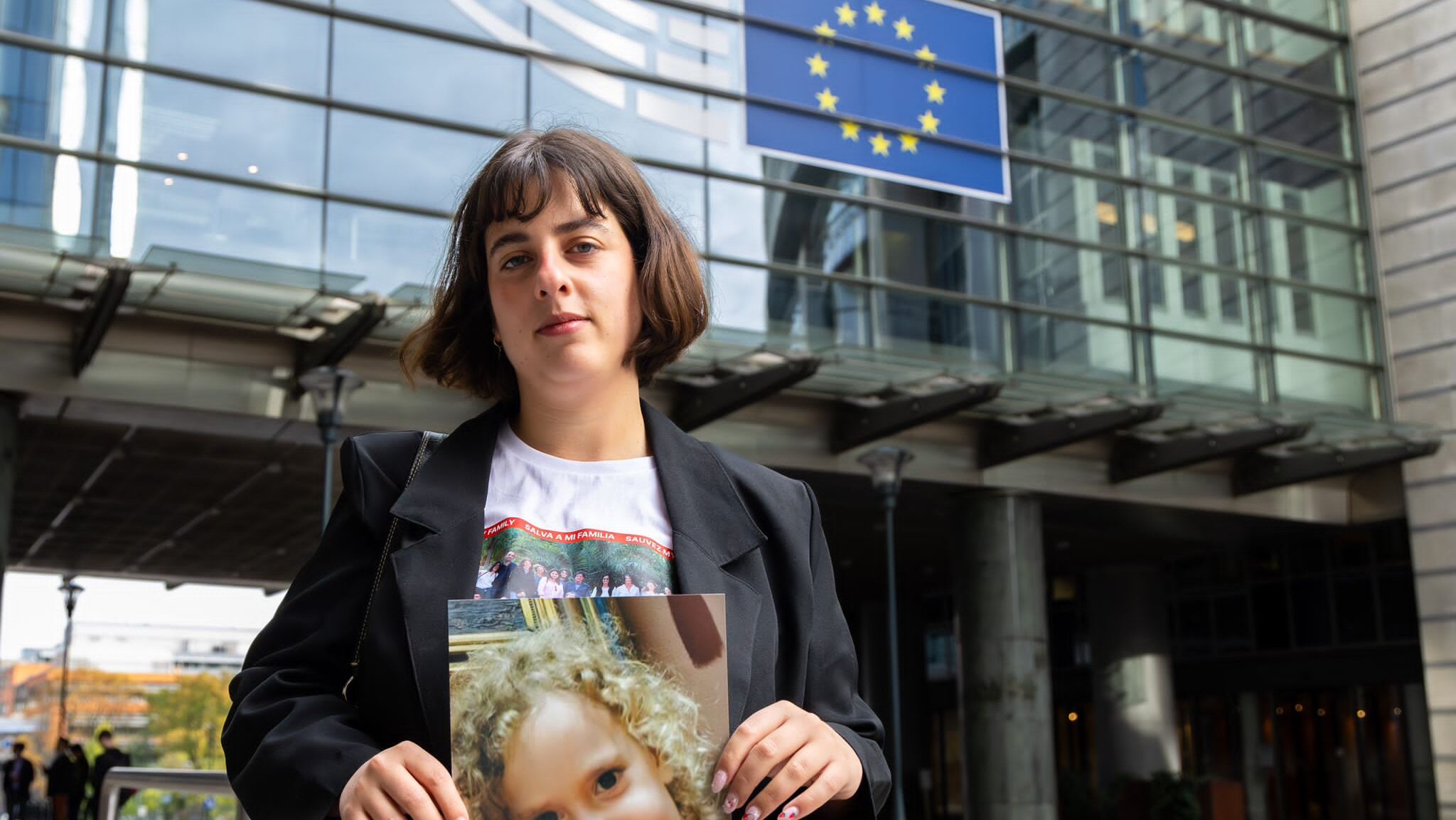Shira Havron Talks About Release of Family Members, PTSD Book Written by Murdered Author Lilach Kipnis, and Tal Shoham, Captive in Gaza
“We know that the Red Cross has not seen them, so the fear is that they’ll be forgotten”
During the Hamas incursion into southern Israel on October 7, 2023, multiple members of a 13-person extended family were either murdered or taken hostage.
The murdered family members included Avshalom Haran, 66; Lilach Kipnis, 60; Eviatar Kipnis, 65; and Eviatar’s caregiver, Paul Castelvi.
Nine family members kidnapped from Kibbutz Be’eri and taken as hostages to the Gaza Strip included Shoshan Haran, 67; Adi Shoham, 38; Tal Shoham, 38; Naveh Shoham, 8; Yahel Shoham, 3; Sharon Avigdori, 52; Noam Avigdori, 12; Judith Raanan, 59; and Natalie Raanan, 17.
During the cease-fire, all captive family members were released except for Tal Shoham, 38, the father of Naveh and Yahel, who remains captive in Gaza.
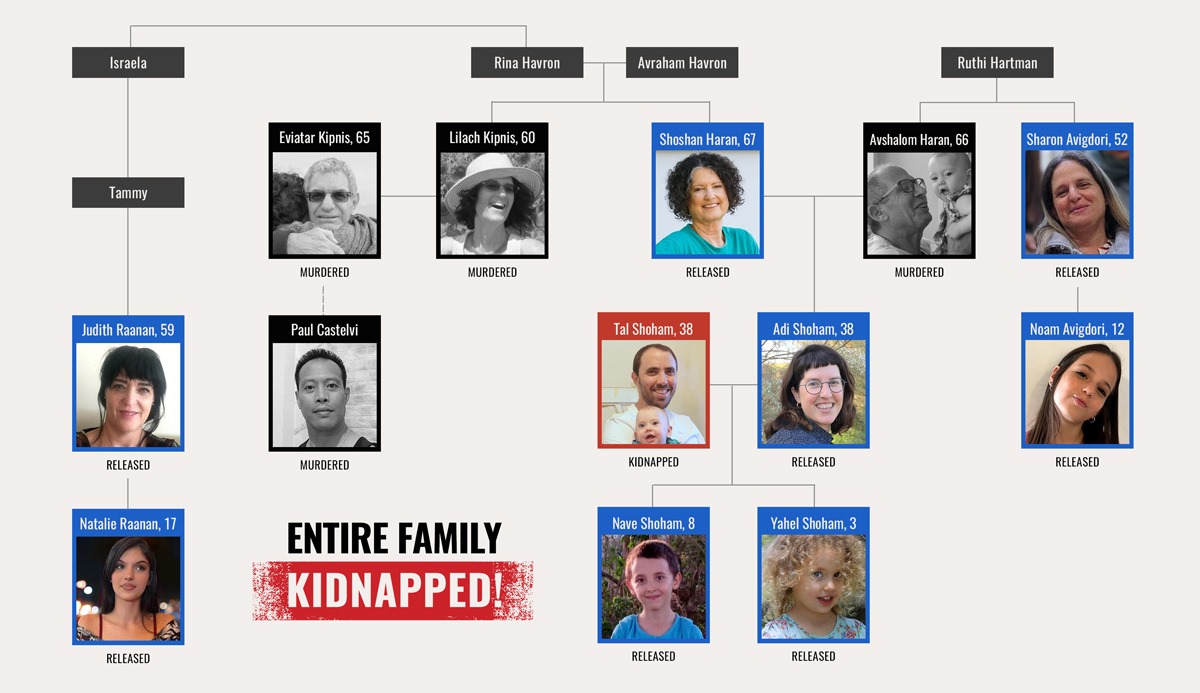
Family tree of the extended family. (Courtesy)
At the time of the attack, Lilach Kipnis was writing a book for children suffering from post-traumatic stress disorder. Posthumously, her family published the book, unveiling it at a ceremony at the official President’s Residence in Jerusalem.
Shira Havron, a family relative and Tel Aviv University film student, works daily to raise global awareness of her family members’ ordeal. The Media Line interviewed Shira at the end of October.
Felice Friedson interviewed Shira again following the release of seven out of her eight relatives who were held hostage.
The Media Line: Shira Havron is a member of a very large family from Kibbutz Be’eri, many of whom have just been freed. We spoke with Shira about a month ago, and now many of her family members have been freed. How are you feeling, Shira?
Shira Havron: It’s good to talk to you in these circumstances. They are definitely better than the past. We feel better. I feel better. I think that it’s really amazing to see the family that we didn’t have any connection with for 50 days safe with us in a relatively fine physical condition.
We worked for this day, we wished for this day, and now it’s here. Some of them are back, most of them are back. But for a second we can’t forget there are still [hostages left]. Tal, my cousin’s husband, is still over there, the father of the kids that need him. Alongside, of course, almost 170 hostages that remain in Gaza today after these exchanges that have been going on for the past couple of days. [Note: With the releases of the past few days, the number is now less than this.]
And it’s definitely a complicated situation. We can’t celebrate yet. It’s not complete. It’s not done until everyone is back. But you know, at least we have some back and we have the children back, which is amazing, and I’m sure they’ve been through a lot. We’re together now.
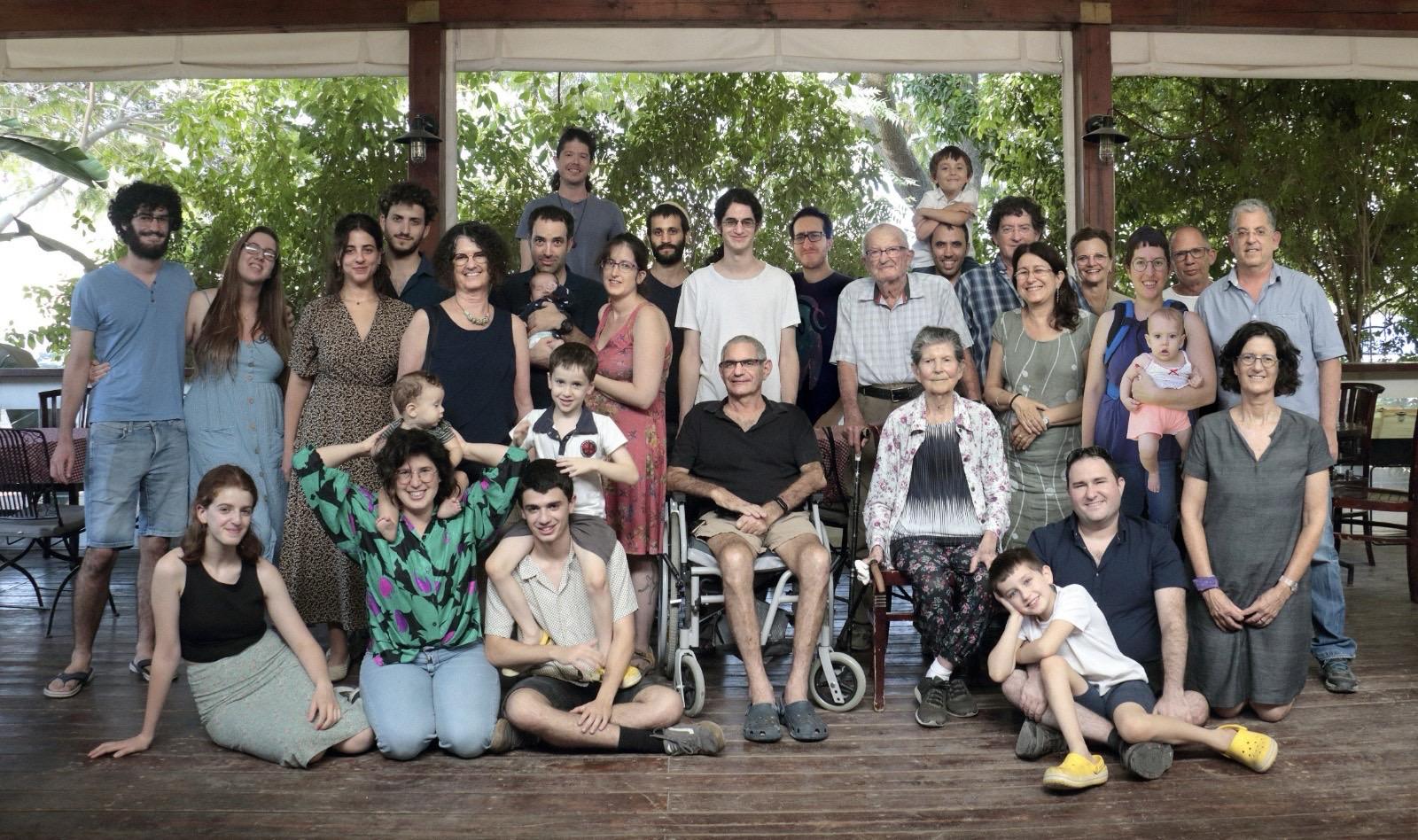
The extended family, at a family gathering. (Courtesy)
TML: Take a moment. We’re talking about a large, extended family. We went through this initially when we spoke about a month ago, but I think it’s important to talk about [how] some of the relatives were murdered. You mentioned that Tal is still there in Gaza. I’d like you to go through, a little bit, the extended family again so people know who you’re talking about.
Shira Havron: So, I am talking about the hostages or the murdered?
TML: Everyone. I think that it’s really important to share what happened in this past month.
Shira Havron: So, again our story on Oct. 7 was that, first of all, seven of my family members were taken hostage that day. Since then, about three days ago, six have returned. We are talking about the women and the children: my aunt Shoshan, my cousin Adi, her kids Naveh and Yahel, and my uncles’ sister Sharon and her daughter Noam.
As you said, Tal is still there. The father of the kids, alongside more than 150 hostages. The numbers are changing these days, fortunately. Besides that, there are some family members that we’re not going to see. On that day, on Saturday [Oct. 7], we lost two of my uncles, Shoshan’s husband’s Avshalom, and also Shoshan’s little sister, Lilach, and my father’s little sister, and her husband. She lost her husband Eviatar alongside his caregiver Paul, who was a Filipino man and had been a part of our family for many years.
So, those four people we’re not going to see again and it’s very hard to navigate the situation, the emotions in it. We can’t really stop working to bring back all of the hostages and Tal, and we can’t really mourn. And we have our family back, and obviously it’s great, but now they have to step into reality again and adjust and recover and heal. Obviously, it will take time, and we’ll be there for them for everything, but it’s complicated. It’s complicated.
TML: Shira, I know that there are things that you can share and things that you can’t share, and I respect that completely. What’s important now is that people are trying to absorb the enormity of this, of what your family went through. We know things are out in terms of they weren’t fed well, they didn’t sleep well. Can you share any component of what they went through?
Shira Havron: I can’t really say much, because obviously there are authorities involved and an investigation, etc., but my family came back in relatively good physical condition, which means we assume they ate, and they could sleep in the condition they were in. But yeah, it’s another level of a trauma, but we’re happy that they came back relatively healthy, because some didn’t, and we hear the stories and they will continue to come.
TML: I’m really sorry for everything you’ve been through and still [are] going through, and I know that the world is very, very concerned, because it’s very hard to know what’s going to play out over the next few weeks, and there is very great concern particularly about the men. So, when we talk about Tal, being a father and a husband and a son, still there, and so many men that have not been freed, what are you hearing? What are you hearing from the other families and your family about this issue in particular?
Shira Havron: I think, for us, we are lucky to receive some of our family members back, and we had so many of them [held hostage] and some people have less [family members returned], but anyway, we’re happy to have some of our people back. We obviously hear a lot of stories about families that have been torn apart. Some stayed and some came back.
We hear about separation between mothers and children and fathers and children mainly. And I think that nobody can really move on and feel completely safe and protected and really come back to reality from this hell they’ve been through until they have their family with them, including the fathers and the mothers that are still there.
Besides that, in the past 53 days we’ve been in touch with a lot of other families in the [Hostages and Missing] Families Forum etc., so we know the feelings of people that have their sons there, as young men and young women. Their names are not in the deals at the moment, which breaks my heart, because everyone deserves to get their loved ones back. And it’s not fair that some of them will get them, because they are children and mothers, and some won’t. They are all equal. They are all people. They all need to be back.
In addition to that, we continue to do interviews. We continue to tell stories, because it’s important for us that the issue will remain on the agenda and this momentum will help us to bring back more people eventually, and not only have the opportunity to tell stories again and tell [us] about the people who are still there in words and in interviews. What’s important is that the decision-makers have to take this momentum to save more people and save everyone that can be saved. The issue of the hostages has to stay as the priority, as the goal of this war, and after that, it can end. It has to be equally important to bring everyone else back.
TML: What’s your biggest fear? I mean, there’s a lot of politics at play, so if you had to look at what may play out now, and nobody really knows, what’s that fear?
Shira Havron: We fear, of course, that they’ll be forgotten over there, just as we were scared of families coming back, because time is passing. And as I said before, and it’s still relevant, the time that is passing is not on our side, and not on their side, mainly on the hostages’ side. There are people over there that are injured, that are sick, that need medication, and they don’t have it. We know that the Red Cross has not seen them, so the fear is that they’ll be forgotten. That they’ll die over there.
Because of the amount, the exchanges need to continue. We can’t let them rot over there while politics and war control us. Everyone has to cry with us and demand their return amidst this crazy political situation in our region, and we know how complicated it is here.
This situation, the hostages, has to remain apolitical, and it’s still a top priority for anyone who believes and supports human rights everywhere. It should be very, very clear, and nothing has changed. We got our family back. Some of it, not all of it. The family is not complete without Tal and all of the others. And some families didn’t receive anything in these past couple of days.
And it can’t be allowed. Everyone is equal. Everyone has to have their loved ones back home. It’s really that simple. And we can’t let them stay there any longer.
TML: Did your family know anything at all? Did they have access at least to a radio or TV? Did they know anything that was happening?
Shira Havron: Besides the information that they got on that 7th of October, that day, not really. Not really.
TML: So, what was your initial feeling when you saw them?
Shira Havron: I actually saw my aunt today. I haven’t seen the kids yet, but my dad saw them, and it was amazing. It was like seeing a woman from a myth coming true in front of your eyes, because we haven’t seen her for 50 days. She became something that all of us fought long for, and we didn’t lose hope for a moment. But the days were so long, and we anticipated it so much, so it was such a crazy feeling to see her in reality and hug her after everything she’s been through.
She’s been through so much, and now to see her and to win her back is just really incredible, beyond words, I think. Beyond words. And it’s really sad that she has to come back and not only adjust to all of them—not only adjust to life again, and deal with the gaps that have been created over these 50 days—they also have to mourn their aunt, their sister Lilach, or their husband or father Avshalom.
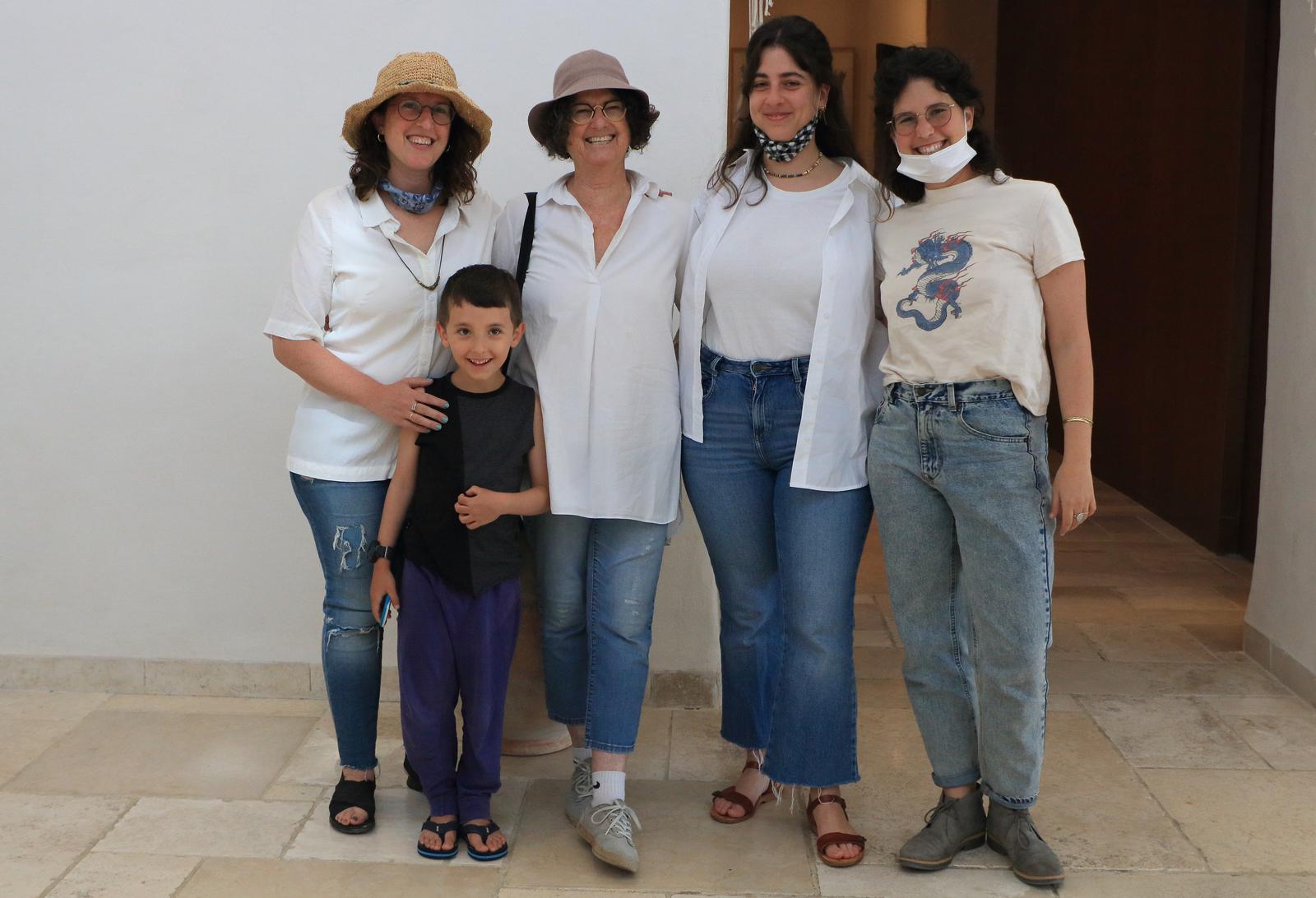
Lilach Kipnis (center, in hat) with family members. (Courtesy)
It’s coming back and discovering that the family has been shattered. We are a strong people. We will get over it. We will be together in it, but it’s definitely an impossible situation, what is happening to us. It’s so many, so many things mixed together. We’ll have to learn to slowly deal with everything.
TML: Take a moment to talk about your aunt. Here is your aunt Shoshan, who was involved in building a nonprofit for feeding the poor, a world hunger program, and here she was held hostage, and we know that many of the hostages were not fed well. I can’t imagine what she’s thinking hearing this, if she didn’t experience it or if she did experience it herself, but that’s what went through my mind as well. How do you come to terms with some of these things?
Shira Havron: I don’t think we can ever come to terms, because it’s a language of behavior that we don’t understand. It’s not a human behavior what happened to them, what’s been done to them, I mean. And I can just say that when I saw her today, I saw and felt that this woman is so strong, and I don’t think that her beliefs will be shaken. I think she will stay the same person.
Obviously, you have to deal with the trauma and take care of mentally for everyone, but I think that this is exactly the story. Against all odds, since forever in her life, she’s fought to build her life around her beliefs, and even the fact that she was hurt so brutally, her and her loved ones, her family, her daughter, her grandchildren, her husband, her sister, I think she will insist as we all do to stay ourselves and keep our core values and continue the work that we do for our family, for humanity, for saving whoever we can save, and for peace, because nothing like this can happen again.
We have to make sure that this is the last time that anyone gets hurt, and I think this is why [we are] who we are, because this area, this region we live in. There has to be a solution, an arrangement. Peace became a hard word for some people. This is the story of some people who have been treated so badly but still have strength to do good, because this is the answer.
I’m sure we’ll see her very, very soon in some country in Africa, going back to her life’s mission. Obviously, it will take time, and we have to give her space and time, but I really believe that I’ll see her and I’ll see the rest of my family continue to be who they are, even after all this.
TML: You’re a film student, and yet you have taken a hiatus now to take care of these very important things for your family, and you were at the EU, the European Union, because some of the family have dual citizenships. Do you feel that that’s been helpful? Do you feel that going out and speaking to the politicians has made a difference?
Shira Havron: I think so. I don’t know what exactly helped practically, and what just made someone feel something and do something like tell someone else the story and spread the word. But I think that after we got to see some of our family and to see the children alive and functioning after these past 50 days, have gained meaning in the sense of all of the work, the hard work.
Everyone in my family, including myself, went to the EU, but everyone worked so, so hard in all the frontiers. I think everything helped, because nothing was a waste of time. Everything. You sit in front of someone and tell the story, you gain another person who supports your cause and can keep this on the agenda. Think. Pray. I don’t know. So, I think anything. It helped. I can’t say that it solved the issue and made the deal approved, but I just feel that it’s important to tell the story. This is the main thing, and to really highlight this situation of hostages that really not enough people are aware [of] and are talking about it shockingly.
TML: 3- and 8-year-olds! I mean, you can’t even imagine the hell of that, and you said that you haven’t really seen them yet, but I’m sure you’ve heard. What are you hearing that they’re saying as kids, because kids express things differently?
Shira Havron: Yeah. Yeah. They are both amazing, and Naveh is very, very open. [He] hugs everyone immediately. A couple of minutes after he returned, he played soccer. They brought him a football and a shirt, and he just wore it and he just played and enjoyed. And my mom got him an origami kit, and he was really, really excited about that.
And Yahel, she takes her time. She opens [up] slowly, but then when she opens [up], she laughs a deep good laugh. And as some other kids came back and told, I think today it will be published in the press, some came back and they are always whispering because of the many reasons that they had to whisper over there. So, Yahel is also talking quietly. But, again, she’s laughing very loudly, so that’s good. You feel the child in her. Alongside the trauma, she’s still a little girl.
Alongside the war that has to be done obviously for them too, and [despite] everything they saw and went through, they remained themselves. It’s really heartwarming to know that.
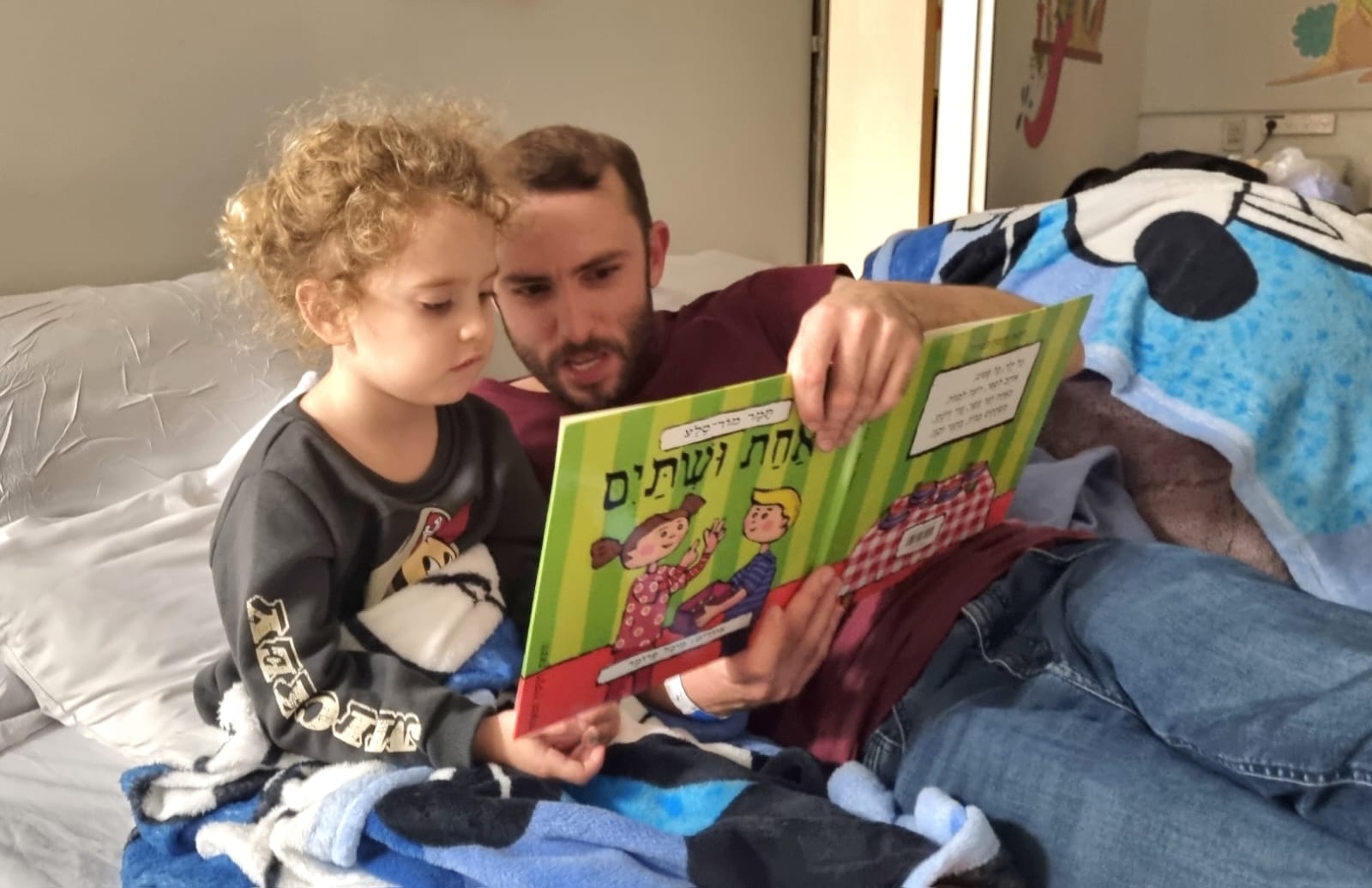
Yahel Shoham, 3, after her release from captivity. (Courtesy)
TML: It gives you hope. That’s so important. That’s so, so important, and right now there are so many questions. Will Kibbutz Be’eri be rebuilt? Will the families move back? What will be the border line? I’m sure some of these questions, I don’t even know if you can answer them on behalf of your family or how the government will intervene.
Shira Havron: Yeah, it’s disheartening, I think, to know. We’re still amidst the storm.
TML: But one question really does come to mind, because it was such a catastrophic day, Oct. 7. In looking back, you going out and thinking about everything that’s happened, how do you feel? You see the Israeli army and they are in a battle for the security of Israel. What goes through your mind about the horrific things that were done by terrorists to your own family? And how do you come to terms of the safety and future of not just your family, but for the whole state?
Shira Havron: I can’t talk about the Israeli military that are battling in Gaza. I think that it’s very important to say that us as a family, and me as an individual, we hate to see suffering from anywhere, so seeing pictures from Gaza and the death toll rising up, it’s really devastating. And this is why I wish the war to be over as well, because every civilian deserves to live in safety and in peace and with a sense of security.
Regarding what has been done to my family and the future, I think we focus now on saving whoever we can—saving Tal and the other hostages, all of them—and taking care of the people who came back. [We can] make little gestures and do little memorials for the people who are no longer with us.
Just today, we were with the president of Israel for the launch of Lilach’s book, that we published after her death, for children who suffer from PTSD. So now this book is very relevant for every kid in Israel, basically. And it’s amazing to see it in so many copies. I know it will be in every home in Israel, probably. So, we’re busy with the living. We are busy with working.
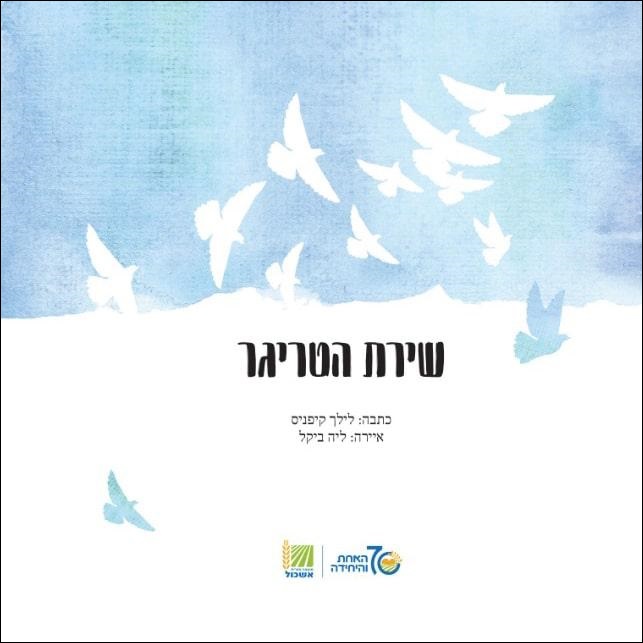
Lilach Kipnis’ book, “Shirat hatrigger.” (Courtesy)
And the damage that has been done—obviously it’s really hard to grasp that this is how my loved ones found their death, by a brutal massacre. It’s something. It’s not only that they died, they were murdered brutally, and the best people for me died this way. It’s horrific to know that my handicapped uncle was probably shot brutally because he couldn’t walk or keep up.
And knowing that someone saw someone else get murdered, it’s something. You know, the last minutes of their lives, they’re suffering. They are scared. It’s something that I think will take a lot of time to deal with, because it’s ringing in my head and everyone’s head now. And we’ll have to learn to live with this knowledge.
Regarding the future and the sense of safety, this is also too early to say, I think. It’s too early to say. I also have a dual citizenship. I have a German citizenship. So, we all have kind of a second home in Germany, because my grandfather came from there. So, we’ll see what happens, but now we’ll try and live with everything that we’ve been through, after the hostages will be back, of course.
Because it’s not over yet. We really [won’t] allow ourselves to think about the future and reflect until all of them are home. So, it’s postponing those thoughts and processes, because we have to continue and work.
TML: Shira, thank you so much. I really wish you comfort and better days, and that Tal and everyone else that you love comes home.
Shira Havron: Thank you!
TML: And thank you, very, very much!
Shira Havron: Thank you so much!
